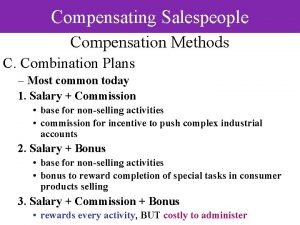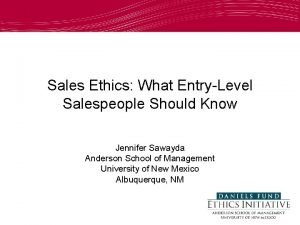4 15 Adara 55 Salespeople who moonlight or









- Slides: 9

4. 15 Adara

55. Salespeople who moonlight or attend classes on company time are guilty of? Wasting their time. B. Unethical behavior. C. Violating laws. D. Misusing assets. A.

56. One way business can help its salespeople demonstrate ethical behavior in selling situations is by Developing sales quotas. B. Establishing gift-giving guidelines. C. Making price deals. D. Requiring reciprocity. A.

57. Hotel supply salespeople who give expensive gifts to customers in an attempt to obtain their business are Violating local laws. B. Overstating expenses. C. Accepting bribes. D. Unethical behavior. A.

58. Taking a client golfing is usually acceptable, as long as The salesperson does not talk about business during the outing. B. The business relationship does not include awarding a contract. C. The golf excursion lasts no longer than three hours. D. The salesperson spends no more than $100. A.

110. Which situation demonstrates ethical behavior in selling? A. Tom sells Mrs. Smith she can save $100 by purchasing a vacuum cleaner without the carpet attachment, because she has hardwood floors. B. Mrs. Thompson tells John she cannot give him a raise, so he should claim additional expenses on his monthly expense account to make up for it. C. Ron tells the customer she can save an additional $25 if she makes her check out to him instead of the company. D. Mayhew’s raises prices on its clothing prior to a 25%-off sale so customers can feel good about the amount of money they are saving.

A Tom sells Mrs. Smith she can save $100 by purchasing a vacuum cleaner without the carpet attachment, because she has hardwood floors. Tom is doing the customer a favor and demonstrating ethical behavior by not selling her something for which she has no use. Mrs. Thompson is encouraging John to pad his expense account, thus costing the company additional money. This practice demonstrates unethical behavior towards the company. Even though Ron is saving the customer money, he is undercutting his company. Mayhew’s is engaging in a practice that is both illegal and unethical.

11. How can reciprocal sales arrangement between a buyer and seller create an unethical situation? A. B. C. D. Ethical issues can occur when the reciprocity hurts or eliminates competition. Reciprocal sales arrangements usually result when a branch of warranty occurs. Ethical issues usually occur when the reciprocity is technological in nature. Reciprocal sales arrangements almost always create price discrimination.

A Ethical issues can occur when the reciprocity hurts or eliminates competition. Reciprocal sales arrangements agreements between two parties that they will buy products from each other. Reciprocal sales agreements do not always create ethical dilemmas; however, problems can occur when the two parties deliberately try to eliminate competition. Price discrimination occurs when a seller has different pricing structures for similar customers. Reciprocal sales agreements do not necessarily create price discrimination. A breach of warranty occurs when the quality or performance of a product is misrepresented by the seller. Reciprocal sales arrangements can occur with any type of business. Therefore, technological businesses are not any more likely to experience ethical dilemmas when engaging in reciprocal selling arrangements than other types of business.
 Combination plan for salesperson
Combination plan for salesperson Effective salespeople anticipate and handle
Effective salespeople anticipate and handle Salespeople do not represent customers to the company.
Salespeople do not represent customers to the company. Consultative selling definition
Consultative selling definition The ocean danced in the moonlight
The ocean danced in the moonlight Film poster analysis example
Film poster analysis example Banana yoshimoto kitchen
Banana yoshimoto kitchen Seascape rembrandt
Seascape rembrandt Moonlight film analysis
Moonlight film analysis Tom thomson, opulent october, winter, 1915
Tom thomson, opulent october, winter, 1915

















